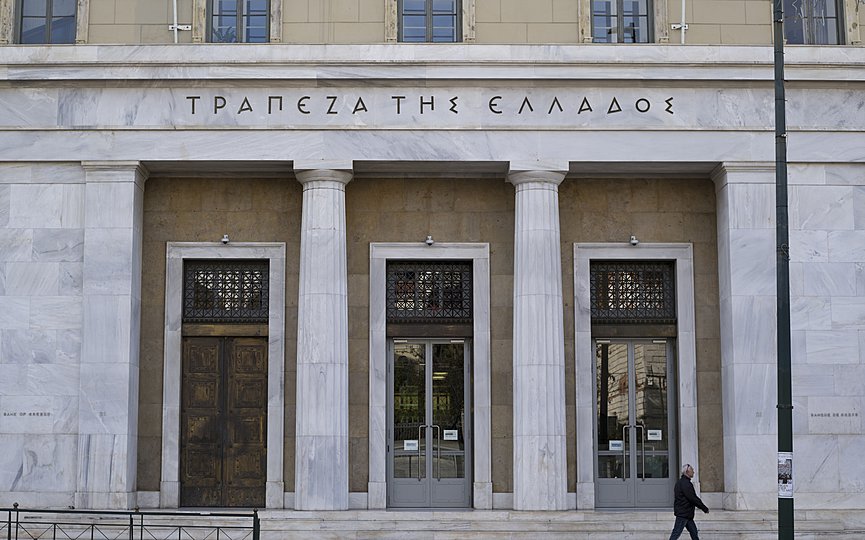General News
Meropi Kyriacou Honored as TNH Educator of the Year
NEW YORK – Meropi Kyriacou, the new Principal of The Cathedral School in Manhattan, was honored as The National Herald’s Educator of the Year.

ATHENS – Rising interest rates by the European Central Bank and a decline in real available income bring risks to a smooth repayment of mortgage loans by Greek households, the Bank of Greece said in its Financial Stability Review for November 2022.
The central bank, in a report released on Thursday, warned that an ongoing normalisation of monetary policy with interest rate increases in the Eurosystem is expected to gradually impact the capacity of households to service their debts, the majority of which have a floating interest rate. The Review noted that low mortgage interest rates in the last few years helped households to service their loans and helped to avoid a negative impact on the stability of the financial system.
The Executive Summary of the Financial Stability Review was posted on Thursday on the Bank of Greece website. The Review is published twice a year by the Financial Stability Department. The Review assesses financial stability developments in Greece, identifies the main systemic risk factors for the domestic banking sector and other sectors of the Greek financial system and analyses the operation of financial market infrastructure (i.e. payment systems, payment cards, central securities depositories and central counterparties).
More specifically, the November 2022 Financial Stability Review focuses on developments in the banking sector over the first half of 2022. It also includes three Special Features, discussing the following topics: (a) evolution and structure of GDP on the basis of Gross Value Added by sector of economic activity, and respective bank credit; (b) the European and national regulatory framework on information and communication technology (ICT) and security risk management by financial institutions; and (c) reforms to rationalise the channelling of public funds by the Bank of Greece through the System of Treasury Accounts.
Inflationary pressures, heightened uncertainty surrounding geopolitical and energy developments, and the subsequent normalisation of monetary policy impact the financial condition of households and businesses. Rising operating costs for firms, declining household real disposable income, as well as higher funding costs for investment, could dampen bank profitability and would point to a weaker economic outlook. Against this background, the banking sector needs to adjust in a timely manner, so as to address the challenges ahead.
The high stock of NPLs remains the biggest challenge for the Greek banking sector. The significant reduction in the NPL stock has led to a marked decrease of the NPL ratio (June 2022: 10.1%); nonetheless, banks should step up their efforts to bring this ratio closer to the EU average. Moreover, the worsening economic outlook adds to the uncertainty surrounding the debt-servicing capacity of non-financial corporations and households. Accordingly, banks could face a renewed deterioration of their asset quality with a new wave of NPLs.
In the first half of 2022, liquidity conditions in the banking sector presented a mixed picture. Access to money and capital markets for funding became more difficult in the context of monetary policy normalisation. However, deposits continued their upward trend (September 2022: €185.5 billion), reflecting strong economic growth and credit expansion, mainly to firms.
Greek banking groups’ capital adequacy declined marginally; the Common Equity Tier 1 (CET1) ratio on a consolidated basis stood at 13.2% in June 2022, slightly down from 13.6% in December 2021, and the Total Capital Ratio at 15.9%, down from 16.2%, respectively. This decline was mainly due to an increase in risk-weighted assets, as the negative impact from the phasing-in of International Financial Reporting Standard 9 (IFRS 9) on banks’ regulatory capital was offset by the positive impact of half-year profits. Specifically, in the first half of 2022, Greek banking groups posted profits, after tax and discontinued operations, amounting to 2.3 billion, compared with losses of 4.0 billion in the same period of 2021.
Αctions taken in the context of the implementation of banks’ strategies to further reduce the stock of NPLs (after the expiration of the HAPS), including possible outright NPL sales, are likely to entail higher capital charges. Therefore, amid deteriorating conditions for tapping money and capital markets, enhancing banks’ internal capital generation capacity by strengthening core profitability becomes a priority.
Finally, the quality of Greek banks’ prudential own funds remains low, as deferred tax credits (DTCs) amounted to 14 billion in June 2022, representing 58% of total prudential own funds.
Heightened uncertainty about the economic outlook and the inflation trajectory, as well as increasing risks to financial stability, call for strengthening the resilience of the financial system and for vigilance from all relevant stakeholders, in order to ensure the continued smooth financing of the real economy. In this regard, the faster absorption of Recovery and Resilience Facility (RRF) funds would alleviate pressures, providing crucial support to the financing of the economy.
NEW YORK – Meropi Kyriacou, the new Principal of The Cathedral School in Manhattan, was honored as The National Herald’s Educator of the Year.

MELBOURNE, Australia (AP) — More than 100 long-finned pilot whales that beached on the western Australian coast Thursday have returned to sea, while 29 died on the shore, officials said.
BAYSIDE, NY – Daughters of Penelope (DOP) Ilion Chapter 135 continues to keep the light shining bright within.
NEW YORK – Mike Labatos, AHEPA District 6 Lt.
Cretans are known for loving their guns but the island has the dubious record of having the highest rates of suicide in Greece over the last 25 years, averaging 2.
ATHENS - Forgetting the 2010-18 economic and austerity crisis that saw people so desperate they were picking food out of rubbish and supermarket bins, Greeks are among the European countries with the ignominious title of food wasters.